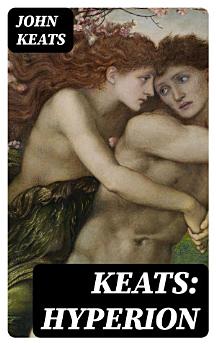Keats: Hyperion
John Keats
Nov 2022 · DigiCat
I-Ebook
25
Amakhasi
family_home
Kufanelekile
info
reportIzilinganiso nezibuyekezo aziqinisekisiwe Funda Kabanzi
Mayelana nale ebook
In "Hyperion," John Keats explores profound themes of beauty, mortality, and the struggle for poetic transcendence, weaving a tapestry of lush Romantic imagery and deep philosophical inquiry. This unfinished epic poem draws inspiration from classical mythology, particularly the Titan Hyperion, embodying a narrative steeped in the tension between the sublime and the human condition. Keats employs a rich, lyrical style that fuses personal anguish with universal truths, set against the backdrop of an evolving 19th-century literary landscape that sought to reconcile the spiritual and the material. John Keats, an emblematic figure of the Romantic period, faced significant personal challenges, including the death of loved ones and his own declining health, which profoundly influenced his creative output. His deep appreciation for beauty—both in nature and art—is evident in "Hyperion," revealing his quest for meaning amid the turmoil of existence. Keats's engagement with Hellenistic themes reflects his desire to elevate the human experience through poetic expression, establishing a legacy that resonates through the ages. "Hyperion" is an indispensable read for anyone interested in Romantic literature, offering insights into Keats's thought processes and emotional resilience. The poem's exploration of the artist's plight parallels contemporary struggles, making it timeless in its appeal. Readers will find themselves captivated by Keats's lyrical genius and the haunting beauty of his unfinished vision.
Mayelana nomlobi
John Keats (1795–1821) stands as one of the most celebrated English Romantic poets. His oeuvre, although remarkably short due to his early death from tuberculosis at the age of 25, left an indelible mark on English literature. Born in London, Keats pursued medical studies before fully devoting himself to poetry. Heavily influenced by the classics, his writing is characterized by sensual imagery and a profound appreciation for the beauty of the natural world. 'Hyperion,' an epic poem published in 1820, exemplifies Keats' ambitious lyrical voice and mastery of blank verse. It draws from Greek mythology, depicting the fall of the Titans and the rise of the Olympian gods, capturing the transformative power of suffering and the plight of the artist. Though his work sold poorly during his lifetime and critics initially dismissed it, Keats' reputation grew posthumously. His letters and the 'Odes' written in 1819, including 'Ode to a Nightingale' and 'Ode on a Grecian Urn,' are considered pivotal in the Romantic canon. Keats' poetry extols the imagination and the senses, establishing him as a counterpoint to the rationalism of the Enlightenment and heralding the modern poetic form with its introspective, personal expression.
Nikeza le ebook isilinganiso
Sitshele ukuthi ucabangani.
Ulwazi lokufunda
Amasmathifoni namathebulethi
Faka uhlelo lokusebenza lwe-Google Play Amabhuku lwe-Android ne-iPad/iPhone. Livunyelaniswa ngokuzenzakalela ne-akhawunti yakho liphinde likuvumele ukuthi ufunde uxhunywe ku-inthanethi noma ungaxhunyiwe noma ngabe ukuphi.
Amakhompyutha aphathekayo namakhompyutha
Ungalalela ama-audiobook athengwe ku-Google Play usebenzisa isiphequluli sewebhu sekhompuyutha yakho.
Ama-eReaders namanye amadivayisi
Ukuze ufunde kumadivayisi e-e-ink afana ne-Kobo eReaders, uzodinga ukudawuniloda ifayela futhi ulidlulisele kudivayisi yakho. Landela imiyalelo Yesikhungo Sosizo eningiliziwe ukuze udlulise amafayela kuma-eReader asekelwayo.








